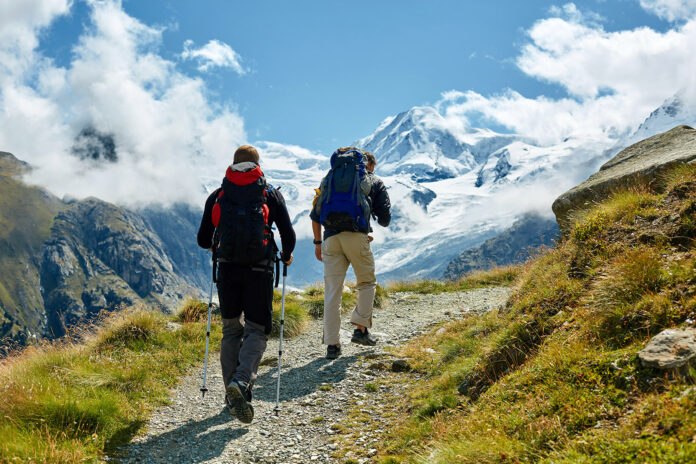
Embarking on a journey around the globe offers a kaleidoscope of experiences, each more enriching than the last. In 2023, travel enthusiasts continue to seek out the ultimate travel destinations that promise not only escape but also a deeper connection with the world.
Whether it’s the piercing peaks of the Himalayas in Bhutan, unforgettable cityscapes, or the rich tapestry of cultures that one encounters along the way, the quest to compile an ultimate travel list is as exhilarating as the adventures themselves.
Discovering Natural Wonders
Embarking on a journey to explore nature’s most stunning creations often leads to unforgettable experiences. Mountains are among these breathtaking formations, with their towering peaks and diverse ecosystems. One seeking to conquer heights and absorb panoramic vistas may find solace in trekking along hiking trails that weave through these majestic landforms.
Visitors may also indulge in the serene beauty of islands and beaches, where the rhythmic lull of waves creates a tranquil atmosphere. This coastal scenery is an invitation for relaxation and an opportunity to witness a diverse range of marine life in its natural habitat.
Remarkable to behold, waterfalls present a dramatic display of water’s relentless force and elegance. Their cascading waters can be both a soothing presence and a powerful reminder of nature’s raw potency.
Yellowstone National Park stands out as a prime example of nature’s diversity, offering geysers, hot springs, and a large array of wildlife. This national park embodies the essence of natural beauty and is a pivotal destination for those aiming to connect with the environment.
One seeking to immerse in the cold allure of nature might consider booking an Iceland holiday. Here, they can witness geothermal wonders and expansive ice-covered landscapes that define the country’s unique topography.
These destinations, each with their own charm, collectively showcase the planet’s incredible variety and the awe-inspiring experiences they offer. They invite travellers to step away from the familiar and delve into the splendour that awaits in the world’s ultimate travel destinations.
Cultural Expeditions and Heritage Sites
Travellers with a penchant for history can embark on cultural expeditions to UNESCO World Heritage sites across the globe. These sites are lauded for their outstanding contribution to heritage and culture. Europe, with its rich tapestry of history, offers an array of destinations where one can step back in time. The continent is home to numerous UNESCO sites ranging from the Acropolis in Greece to the historic centres of cities like Rome or Prague.
In Asia, cultural expeditions take a colourful turn with immersive experiences. The ancient city of Kyoto, Japan, once the imperial capital, serves as a cultural and spiritual nexus. Visitors can explore centuries-old temples and participate in traditional tea ceremonies.
Africa, too, is not without its wonders. Heritage sites on the continent tell tales of early human history and civilisations long past. One can witness the might of the ancient Egyptians through the monumental pyramids and the Sphinx of Giza.
These expeditions not only educate travellers about the world’s diverse cultures and histories but also contribute to preserving these sites for future generations. As guardians of history, UNESCO World Heritage sites are integral to understanding the shared heritage of humanity. Whether it’s the architectural splendour of European cities, the spiritual traditions of Asia, or the ancestral lands of Africa, cultural expeditions offer travelers a profound connection to our past.
Adventurous Travel and Activities
Adventurous travel is about stepping out of one’s comfort zone and engaging with the world in a dynamic way. For thrill-seekers and nature lovers, it represents an opportunity to immerse themselves in activities that revitalize the spirit and challenge the body.
Wildlife and Conservation: Engaging in safari experiences allows travellers to witness wildlife in its natural habitat while supporting conservation efforts. Kenya and Tanzania are popular destinations, offering encounters with the ‘Big Five’ in reserves like Maasai Mara and Serengeti.
- Snorkelling: Explorers can snorkel along vibrant coral reefs, sharing waters with a dazzling array of marine life. The Great Barrier Reef in Australia provides world-class snorkelling opportunities, merging underwater adventure with marine conservation.
- Cycling: For some, cycling routes provide a blend of endurance and exploration. Routes like the French Alps test mettle and offer breathtaking vistas.
Ecotourism is integral to adventure travel, ensuring that activities have a low environmental impact and contribute to the local economy. It is not only about adventure but also about respecting and preserving natural environments.
Adventure destinations cater to a variety of interests, from the adrenaline rush of rafting through untamed rivers to the silent awe encountered when hiking through ancient forests. Each venture serves not just the pursuit of excitement but also the broader goal of sustainable travel.
Sustainable Travel and Eco-Friendly Destinations
Sustainable travel has become a significant focus for those who wish to explore the world with minimal impact on the environment. It involves engaging with ecotourism practices, which support conservation efforts and promote sustainable living within local communities.
- Ecotourism: This form of tourism encourages visitors to explore natural areas, fostering environmental respect and appreciation. It often involves guided tours that emphasise conservation of wildlife and ecosystems.
- Conservation: Destinations known for their natural beauty and biological diversity are implementing strategies to preserve landscapes and species. Efforts include habitat protection and wildlife management practices.
- Rewilding: Some travel destinations focus on rewilding, a process of restoring natural processes and wilderness areas. This approach often involves reintroducing native species and removing invasive ones to balance ecosystems.
- Community: A key aspect of sustainable travel is engaging with local communities. Through cultural exchange and understanding, travellers can directly contribute to the local economy, ensuring a fair distribution of tourism benefits.
Notable examples of regions embracing these principles include:
- Bhutan: This Himalayan kingdom places a strong emphasis on being a sustainable destination. Its unique approach involves a national happiness index and exclusive visitor quotas to minimise tourism’s environmental impact.
- The Scottish Highlands: Renowned for its rugged landscapes, the Highlands offer a chance to engage in sustainable outdoor activities, with local businesses encouraging eco-friendly practices.
For those who are planning their travels conscientiously, sustainable travel destinations not only enhance the experience but also enshrine the principles of environmental stewardship and cultural respect into the heart of their journeys.
Family-Friendly Vacation Spots
When planning a holiday with loved ones, finding destinations that cater to all ages is essential. Hawaii stands out as an exemplary family-friendly location. Its natural beauty provides a stunning backdrop for activities that appeal to both children and adults.
- Beaches and Water Sports: Hawaii’s beaches are perfect for families who enjoy splashing in waves and building sandcastles. Water sports like snorkelling let everyone explore marine life.
- Cultural Experiences: Immerse the family in the local culture with a visit to a luau where traditional dances and foods create a memorable experience.
Another commendable destination is France, home to the impressive Dune du Pilat. This site offers families the unique opportunity to climb Europe’s tallest sand dune and bond over the breathtaking views of the Atlantic coast.
- Outdoor Adventure: The dune provides a natural playground for adventurous families to explore and enjoy.
- Cultural Immersion: Explore French culture by visiting nearby towns and enjoying local cuisine.
For those seeking a blend of adventure and education, destinations featured in National Geographic Traveller often fit the bill. They recommend places that are rich in culture and beauty, allowing families to learn and bond over shared experiences.
Incorporating visits to such destinations into family holidays ensures not just entertainment but also enriches young minds with an appreciation for diverse cultures and environments.
Exploring Untapped and Emerging Destinations
Travellers seeking less trodden paths can find solace in the Sultanate of Oman, an untapped gem with breathtaking landscapes. Oman offers a rich tapestry of unspoiled terrains, traditional culture, and architectural marvels, making it an exquisite choice for discerning adventurers.
Trekking enthusiasts will discover that the country’s mountain ranges, such as the Al Hajar Mountains, provide a stunning backdrop for hikes and offer an authentic touch of Omani wilderness. This activity is not only for the intrepid but also for those wishing to immerse themselves in nature while respecting the local way of life.
In Central America, nations like Costa Rica have forged a name for themselves in eco-tourism. This nation’s commitment to conservation and sustainability sets a benchmark for others, with its lush rainforests and abundant wildlife offering an unparalleled experience for eco-conscious travellers.
Cuba, with its vibrant streets filled with the rhythm of salsa, stands as an emerging destination. Visitors relish in its cultural richness, its history etched onto the very walls of its colonial buildings, and the warmth of its people. Cuba presents an alluring mix of old-world charm and contemporary spirit.
Emerging destinations like these promise travellers an escape from the ordinary, offering unique experiences that traditional hotspots may no longer provide. They encourage exploration through authentic culture, natural beauty, and sustainability, promising memorable adventures across the globe.
Luxury and Tailor-Made Travel Experiences
Luxury travel epitomises the pinnacle of personal indulgence and exclusivity. Discerning individuals seek journeys that provide not only comfort but also a sense of the exceptional, finding such quality in the world’s most exclusive destinations. They are drawn to tailor-made experiences that afford a profound level of personalisation, ensuring that every aspect of their holiday is curated to their precise preferences.
- Personalisation: Each itinerary is crafted with the traveller’s desires at the forefront, making every trip truly unique.
- Exclusivity: Access to destinations and experiences often remains beyond the reach of standard travel arrangements.
High-end accommodations and transport are a staple of luxury travel, where private jets and yachts become conveyances not just of people, but of a particular lifestyle. These exceptional services are designed to create memories that are as splendid as they are singular.
Here are some of the key components of luxury travel:
- Accommodations: From opulent hotels to secluded villas, each lodging is selected for its exemplary service and distinguished comfort.
- Destinations: Whether it be a magical escape to Ireland or an intimate retreat in the Maldives, the focus is always on the extraordinary.
- Experiences: Bespoke excursions can range from private vineyard tours to after-hours access to prominent museums and sites.
Luxury travel is not solely about the lavishness of the environment; it is the meticulous attention to detail by specialist travel advisors that creates an unparalleled experience – one where the journey itself is just as memorable as the destination. Whether one is searching for adventure, relaxation, or cultural immersion, the result is a journey that extends far beyond the ordinary, sculpted to personal specifications with a keen eye on quality.
Food and Gastronomy Tours
Italy: Renowned for its vibrant food culture, Italy offers a plethora of culinary tours that allow travellers to experience authentic Italian cuisine. From the wood-fired pizzas of Naples to the truffle hunts in Tuscany, Italy’s gastronomy tours introduce visitors to traditional cooking methods and age-old recipes.
France: In France, food tours give an insight into the country’s sophisticated culinary techniques and rich gastronomic heritage. Travellers can enjoy a walking tour through the bustling markets, sample fine cheeses and wines, or sit at an exquisite Michelin-starred restaurant in cities like Paris and Lyon.
- Cheese and wine tastings
- Michelin dining experiences
- Market visits and cooking classes
Japan: Japanese culinary tours offer a deep dive into a culture where food preparation is an art form. From the fresh sushi of Tokyo to the unique flavours of Okinawa, these tours explore a wide range of regional specialities that define Japan’s food scene.
China: Explorers of China’s culinary landscape will find a diversity of flavours, influenced by regional histories and cooking styles. They might partake in a cooking workshop, or savour Peking duck and dim sum in local eateries, gaining an understanding of how food is intertwined with Chinese culture.
Throughout these tours, participants not only taste the food but also learn about the origins, preparation, and significance of dishes within each country’s culture. It’s an immersive journey that promises to enrich the palate and the mind.
Impact of Environmental Factors on Travel
Environmental factors significantly influence travel patterns and destination choices. Climate change is a prime concern, as rising temperatures and unpredictable weather patterns can alter the attractiveness and accessibility of certain destinations. Areas dependent on winter sports, for instance, may face challenges due to shorter and less reliable snow seasons.
Deforestation also plays a critical role in travel, especially in regions where natural landscapes are key draws for tourists. The Amazon’s rainforest depletion not only threatens biodiversity but also the very essence of ecotourism experiences that hinge on lush, untouched forests.
When considering biodiversity, the loss of species due to habitat destruction and climate factors has direct implications on wildlife tourism. Epicentres of vast species variety, such as the Great Barrier Reef, suffer from rising ocean temperatures and acidification, potentially deterring travellers seeking rich underwater experiences.
Conservation efforts are becoming more intertwined with travel, as tourists increasingly seek sustainable practices. Destinations that emphasise environmental protection can enhance their appeal by offering guilt-free travel experiences through eco-friendly accommodations and activities.
Lastly, the environment at large dictates travel by defining the natural features that shape a region’s identity. Pollution, whether it be air quality in urban environments or plastic littering in marine settings, can significantly decrease the attractiveness of affected areas, urging the travel industry to adopt more sustainable operations.
- Climate Change: Affects seasonality and destination appeal
- Deforestation: Threatens ecotourism and landscape integrity
- Biodiversity: Central to wildlife-related travel experiences
- Conservation: Influences tourist choices and promotes sustainable travel
- Environment: Overall determinant of a destination’s health and viability
Navigating Travel in the Digital Age
In recent years, the advent of the digital era has transformed how travellers explore and experience destinations globally. Travel apps have become integral tools, offering numerous services from booking accommodation to navigating foreign cities with ease. These apps often provide real-time updates, reviews, and the ability to tailor trips to individual preferences.
The use of online resources has also surged, with platforms offering extensive insights into cultures, landmarks, local cuisine, and activities. Travellers are increasingly reliant on digital content to plan their journeys meticulously.
E-tickets and digital boarding passes are now standard, enhancing convenience and security while reducing paper waste. The digitalisation of travel documents not only expedites check-in processes at airports but also simplifies ticket management for tourists.
The rise of digital nomadism reflects a significant shift in work-life dynamics, where individuals leverage remote work to marry productivity with the allure of travel. Destinations known for robust internet infrastructure and work-friendly environments are particularly popular among this demographic.
Remote work policies have introduced a new dimension to travel, allowing individuals to extend their stays and integrate into local communities beyond the confines of vacation time.
Here’s a succinct summary of the key components transitioning travel into the digital realm:
- Travel Apps: Essential for itinerary management, accommodation, and experiences.
- Online Resources: Guides, reviews, and cultural insights.
- E-tickets: Streamlining travel with digital ticketing.
- Digital Nomadism: Embracing travel while working remotely.
- Remote Work: Enabling longer stays and deeper cultural immersion.
Embracing these digital capabilities equips travellers with the means to embark on smooth and immersive journeys.











